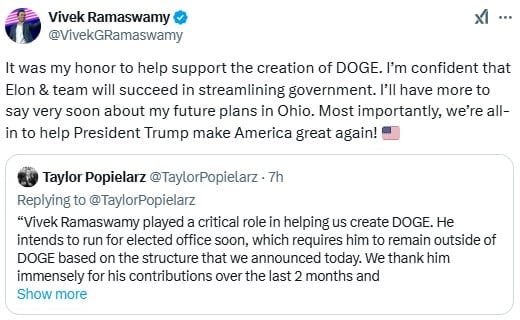Vivek Ramaswamy, former presidential candidate, has stepped down as co-chair of the Department of Government Efficiency (DOGE), an advisory body founded by President Trump and Elon Musk.
In a January 2023 post, Ramaswamy announced his departure, citing his upcoming gubernatorial bid in Ohio. He expressed confidence in DOGE's ability to enhance government efficiency.

As per sources like CBS News and The New York Times, Ramaswamy intends to challenge incumbent governor Mike DeWine, whose term ends in 2027. Ramaswamy's specific campaign strategies remain undisclosed, though he has indicated support for President Trump.
DOGE spokesperson Anna Kelly clarified that Ramaswamy's political aspirations necessitated his resignation, as DOGE policy prohibits office seekers from holding positions within the organization.
Certain comments made by Ramaswamy, such as his concerns about tech companies employing foreign workers, have also been linked to his departure.
Despite Musk's authority over DOGE, Reuters reports that the organization faces legal challenges. The AFGE and Public Citizen filed a lawsuit against DOGE upon its inception, claiming violations of the Federal Advisory Committee Act (FACA). They allege a lack of public accountability and potential influence of private interests on government policies.
DOGE's goal of reducing federal spending by trillions has sparked both support and criticism. While Musk believes it could save billions, critics fear significant cuts to essential social services.
Meanwhile, the cryptocurrency Dogecoin (DOGE) has experienced volatility, with a current price of $0.3422 and a 6% decline in the past 24 hours. Investors are closely monitoring these fluctuations.
As Ramaswamy pursues his political ambitions, DOGE faces ongoing legal battles that may impact its future. The outcomes of these challenges will influence both government efficiency and the broader political landscape.


 DeFi Planet
DeFi Planet Crypto Daily™
Crypto Daily™ BlockchainReporter
BlockchainReporter TheCoinrise Media
TheCoinrise Media DogeHome
DogeHome Crypto Daily™
Crypto Daily™ Crypto Daily™
Crypto Daily™ TheCoinrise Media
TheCoinrise Media






















